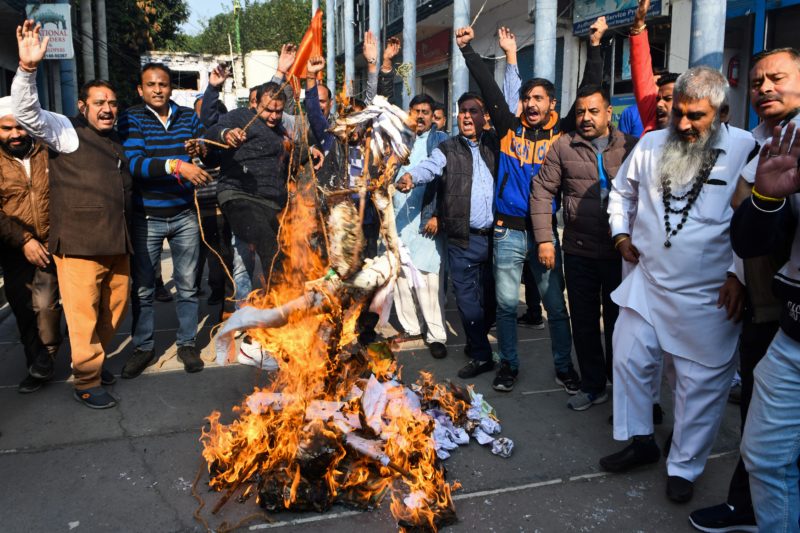India in a State of National ‘Women’s Safety’ Emergency, Call For Long Term Fixes
Activists protest against the rape and murder of a 27-year-old woman in India. Police later shod dead the four detained suspects as they re-enacted the crime. (Narinder Nanu/AFP)
Two weeks before India was to observe the seventh anniversary of the gruesome Nirbhaya rape case of December 2012 that shocked the entire nation, a young veterinarian doctor, on a national highway proximate to Hyderabad, one of the country’s biggest cities and capital of the southern province of Telangana, was raped and burnt to death.
This case, too invited national outrage that poured onto the streets, media and social media platforms, but in a matter of few more days, news desks were abuzz with reports of the 2018 Unnao rape victim having suffered 95 percent burns.
Her body in flames, she ran about half a kilometer in unimaginable agony, crying for help, after she was first attacked by two of her rapists and three accomplices with a knife, stabbed and then set on fire as she was heading to appear in the court hearing.
Among the accused is a former BJP legislator who was released on bail last week, and is also held guilty of snuffing out the lives of two aunts of the victim and grievously injuring the victim in a car accident last year.
And to begin with, this particular case was heard only when in the April of 2018 the victim had threatened to self-immolate near the residence of the Chief Minister Yogi Adityanath.
So much so for a state that has the largest police force and the state administration boasts of ‘transforming the state into one of the safest in the country”.
The past week has also recorded more sexual crimes, one in Tonk, Rajasthan, when a six-year-old child, while returning home from her school sports competition went missing, only to be found dead, her bloodied body sexually brutalized; one in Coimbatore, victim being a Class XI student; a third one in Ranchi, involving an Adivasi law student; and one in Malda, West Bengal, when a dead body of a teenaged girl was found with blood in her private parts.
It would only take an ignoramus to assume that the aforementioned cases are isolated instances as it is commonly acknowledged that even as figures of National Crime Bureau point out that 24,923 cases were reported across the country in 2012 (as compared to the world wide figures, as per a UN report on 57 countries, of just 11 per cent of sexual crimes ever reported), multiple times this number go unreported or unrecorded due to podgy investigation, recalcitrant police system, fear of powerful and moneyed culprits, slow justice system and the social stigma, public shaming and slut shaming of the victims.
The speaking of trials, in 2017, a total 117,451 rape cases were pending in the country, while 28,750 cases were brought to trial.
This was pretty evident in the slow passage of the Nibhaya case trial where four perpetrators still remain on death row, one having received a lesser sentence as he was a minor at the time of committing the crime, and another attacker having being killed in the prison.
But since the 2012 rape case there have been some progress as the government has raised the legal age of the minor to 18 from an earlier 16 years, implemented a fast-track court system to rapidly prosecute rape cases, launched education programs to shape up positive and respectful attitudes towards females, set up a National Database on Sexual Offenders, with 440,000 entries of cases till date, for perusal of law enforcement agencies for investigation and monitoring purpose, compulsorily mandated all government and privately run hospitals to impart free first aid and medical treatment to victims of rape, nullified the two-finger test on a rape victim, and accorded inheritance rights over the property of the assaulter to the children born out of rape, unless taken up for adoption.
The change on ground is also witnessed in the courage evinced by certain victims to come up and report, despite a plethora of hurdles, backed by mass citizen-outrage, even among recent Parliamentarians.
A visibly moved MP, Jaya Bachchan, known for her fiery advocacy of women’s rights, stated in on the floor of the Parliament, “I know it sounds harsh, but these kind of people should be brought out in public and lynched!” and has demanded for a proper and definitive answer from the government on how it planned to improve safety for women and protect them against sexual violence.
In this backdrop has arrived the news of all four accused in Telangana veterinarian’s rape and murder case being shot dead in a police encounter.
The official explanation is that while recreating the incident, at the scene of crime, the accused tried to escape by snatching the guns from some policemen and opening fire, due to which the other police officers needed to counter shoot.
Largely, this encounter has earned the police massive public approval, but critics have raised pertinent questions, equating the police encounter with extra-judicial killings that also negates the rule of law as instituted and long term impacts of this “quick-fix”.
It will therefore serve the governments and institutions for all times to therefore see redressal in a two pronged manner; to immediately reform the police system, to usher in enhanced accountability and transparency that would plug all loopholes that botch up investigations and delivery of justice, right from “answering of public calls to the police helpline centres” all of which will boost the morale of the public and raise their image.
Secondly, expand reforms in legal and justice systems that shall award the strictest of the punishments and in a stipulated period.
Till such measures are adopted individuals will be left to depend on their individual resources to stay safe and which has not just curbed more than a half of the population to live a secure life of dignity and contribute more to the well-being of the country.


